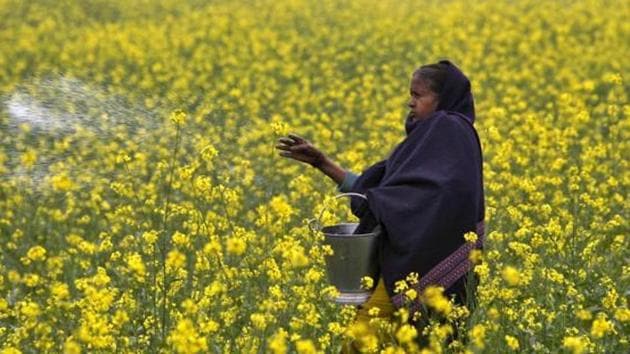GM Mustard not approved, Environment minister tells Supreme Court
An approval by the apex biosafety regulator for the commercial release of what could be India’s first GM food crop kicked off a vociferous debate about GM Mustard.
The environment ministry told the Supreme Court on Friday that it has not granted approval for the commercial cultivation of Genetically Modified Mustard (GM Mustard).

The bench is hearing activist Aruna Rodrigues’s petition asking for a stay on the commercial release of GM mustard, which was cleared by the Genetic Engineering Appraisal Committee, India’s apex biosafety regulator, in May.
On Wednesday, Environment Minister, Harsh Vardhan told Hindustan Times that the ministry was still studying the issue. The Parliamentary Standing Committee on Science & Technology, Environment & Forests, headed by Congress leader, Renuka Chowdhury, had urged the ministry to postpone the decision till the committee had completed its own hearings on the matter.
In its oral submission to the SC the ministry said it would be taking into account the parliamentary committee’s report before making its decision. “While the Centre is saying that it is yet to take a final call, its affidavits in the Court show clearly that it is headed in the direction of allowing an environmental release of GM mustard, by way of pushing for seed multiplication and ‘demonstration,” a release from the Coalition for a GM-Free India, said.
The GEAC approval on May 11 spurred an avalanche of protests from environmental activists who argue that GM Crops fail to improve productivity, they are unsafe for human consumption and for the environment. Farmer groups fear it would increase their dependency on multinational companies that develop these technologies.
In this case, one of the supporter’s biggest claims is that it is developed indigenously at the University of Delhi, under the guidance of Deepak Pental, a geneticist. However, groups like those led by Vandana Shiva, disagree saying that the base patents for the new variety are owned by Bayer AG, an agro major that is in the process of merging with Monsanto, another agro-giant, which would further skew the agricultural technology market.
“In the name of science, they are doing it will make farmers slaves, in the name of science they are trying to double the income of multinationals,” Kavita Kuruganti, an activist associated with the Alliance for Sustainable & Holistic Agriculture, told HT at an Anti-GM rally in Delhi. “If the government brings this variety farmers will have to buy seeds from these companies every year. “
Till now only one GM crop, Bt Cotton, is grown in Indian fields. The only food crop to receive all approvals was Bt Brinjal. However, then environment minister, Jairam Ramesh, rejected its introduction and placed an indefinite moratorium on it.
GEAC chairman, Amita Prasad, told the Hindustan Times that the approval granted by the committee was conditional not absolute and subject to certain conditions regarding area cropped, submission of regular reports.
The GM-Free India coalition believes such a “conditional approval” is farcical as in the case of Bt cotton. “This is all the more unacceptable in the case of GM mustard since this GM is completely unneeded in the first instance... We write to urge you to ensure that this GM mustard application is rejected in toto,” the coalition said in a letter to the prime minister.
One of the sticking points is that the GM seeds are sold by big multinationals at prices that are many times higher than the seeds that the farmers use now. Global agricultural giant Monsanto produces the Bt cotton seeds that are used in India and earns royalties on it. Over 95% of cotton cultivation in India is Bt cotton today.
India is heavily dependent on imports to meet its enormous demand for edible oils including mustard oil. Edible oils are used in generous amounts in Indian cooking. The country produced 5.8 Million Tonnes (MT) of Mustard seeds in 2015-16, while in 2016-17 it is expected to go up to 6.5-7 MT. However, these marginal increases may not be enough to feed the country’s growing population.
In its 2014 manifesto the BJP said it would not allow the introduction of GM food crops in the country without proper scientific assessment. However, activists believe that the government ‘s move to postpone the decision on GM Mustard has more to do with electoral calculations rather than scientific evidence.
With national elections coming up next year, the opposition from RSS-backed farmer groups may not play out too well for the BJP.
“This government which keeps talking about organic farming is bringing poison into the country, why are they forcing the country to eat poison,” Badrinarayan Choudhury, General-secretary of Bharatiya Kisan Sangh, the RSS farmers’ wing, who was part of an Anti-GM demonstration, said. “We will go from village to village to raise awareness among farmers, we will bring them to the streets in protest,” he said.
The next hearing is set for November 22.





